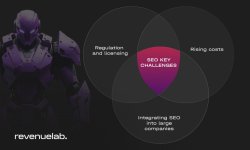Have you noticed how iGaming SEO is getting tougher? With constant Google updates and stricter rules, ranking well takes more than just good keywords — you need to stay sharp and adapt fast.
The competition is brutal, with everyone fighting for those top spots. But beyond that, there are some unique challenges that make iGaming SEO particularly tricky:

- Regulations and Licensing: Promoting iGaming in regulated markets can be a minefield. Advertising restrictions often make it less profitable. Unregulated markets might seem easier, but they come with their own risks, especially for brand reputation, as player protection is often lacking. And while black hat SEO might offer a quick win, the penalties from Google can be devastating in the long run.
Tip for success: Focus on creating authoritative content that aligns with Google’s E-E-A-T principle (Experience, Expertise, Authoritativeness, Trustworthiness). This means detailed articles written by professionals, backed by reliable data and user reviews, with clear mentions of licenses and safety measures.
- Integrating SEO into Large Companies: For bigger organizations, getting everyone on board with SEO can be a real headache. IT, product, and marketing teams often don't fully grasp its importance, leading to resistance when it's time to implement necessary changes.
Tip for success: Integrate SEO specialists into every stage of website updates and marketing campaigns. Educate all teams on the value of iGaming SEO to ensure everyone works towards shared goals.
- Rising Costs: Regulated markets are becoming incredibly expensive. Content creation, link building, and hiring expert SEO specialists can run into tens of thousands of dollars. For some, the expenses might even outweigh the expected ROI.
Tip for success: Prioritize localization! Markets like the Balkans, for example, offer growing demand with relatively low competition. Tailoring content to these regions can be much more cost-effective. Also, optimize your link-building strategy by focusing on quality over quantity – collaborate with local authoritative resources and micro-influencers instead of mass link creation.
It's a tough landscape, but understanding these core challenges is the first step to building a resilient strategy.
What are some of the biggest SEO challenges you've faced in the iGaming space, and how have you tackled them?
The competition is brutal, with everyone fighting for those top spots. But beyond that, there are some unique challenges that make iGaming SEO particularly tricky:

- Regulations and Licensing: Promoting iGaming in regulated markets can be a minefield. Advertising restrictions often make it less profitable. Unregulated markets might seem easier, but they come with their own risks, especially for brand reputation, as player protection is often lacking. And while black hat SEO might offer a quick win, the penalties from Google can be devastating in the long run.
Tip for success: Focus on creating authoritative content that aligns with Google’s E-E-A-T principle (Experience, Expertise, Authoritativeness, Trustworthiness). This means detailed articles written by professionals, backed by reliable data and user reviews, with clear mentions of licenses and safety measures.
- Integrating SEO into Large Companies: For bigger organizations, getting everyone on board with SEO can be a real headache. IT, product, and marketing teams often don't fully grasp its importance, leading to resistance when it's time to implement necessary changes.
Tip for success: Integrate SEO specialists into every stage of website updates and marketing campaigns. Educate all teams on the value of iGaming SEO to ensure everyone works towards shared goals.
- Rising Costs: Regulated markets are becoming incredibly expensive. Content creation, link building, and hiring expert SEO specialists can run into tens of thousands of dollars. For some, the expenses might even outweigh the expected ROI.
Tip for success: Prioritize localization! Markets like the Balkans, for example, offer growing demand with relatively low competition. Tailoring content to these regions can be much more cost-effective. Also, optimize your link-building strategy by focusing on quality over quantity – collaborate with local authoritative resources and micro-influencers instead of mass link creation.
It's a tough landscape, but understanding these core challenges is the first step to building a resilient strategy.
What are some of the biggest SEO challenges you've faced in the iGaming space, and how have you tackled them?